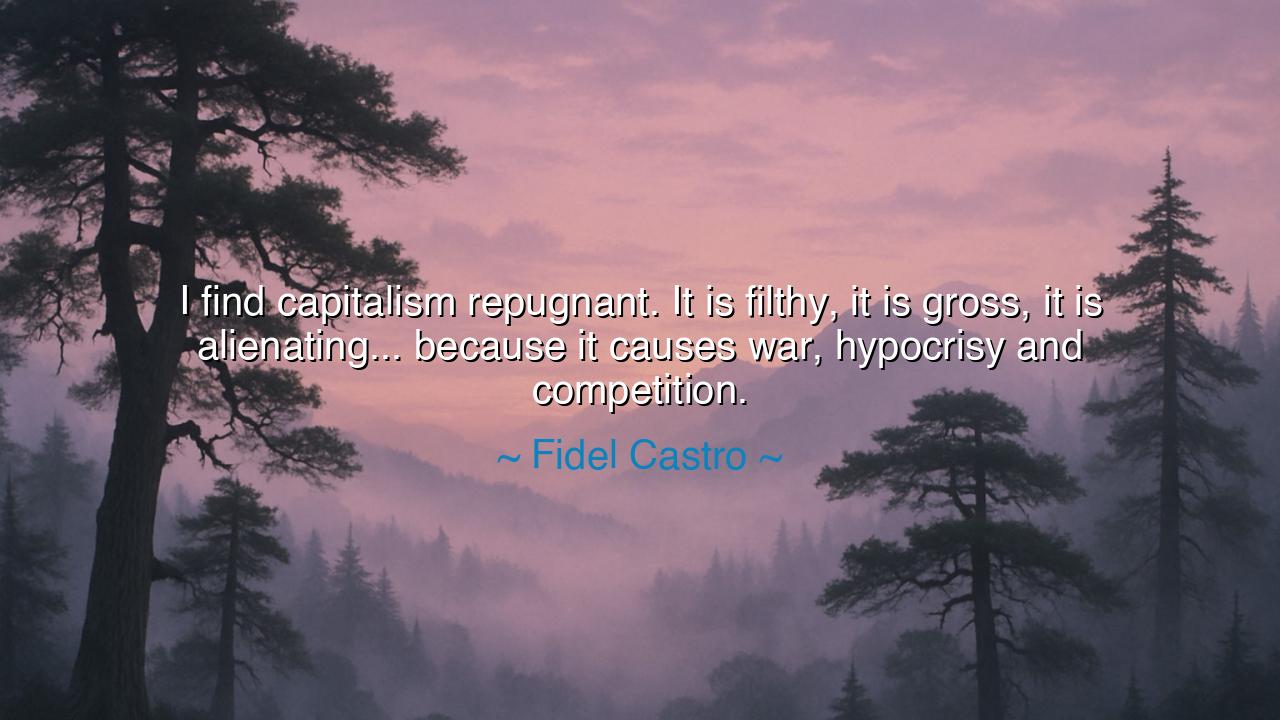
I find capitalism repugnant. It is filthy, it is gross, it is
I find capitalism repugnant. It is filthy, it is gross, it is alienating... because it causes war, hypocrisy and competition.






In the words of Fidel Castro, “I find capitalism repugnant. It is filthy, it is gross, it is alienating... because it causes war, hypocrisy, and competition.” These are not the idle mutterings of a man who merely observed from afar; they are the thunder of one who lived amidst the storms of empire and the burdens of the oppressed. To him, capitalism was no noble system of exchange, but a beast draped in gold, devouring the poor while feeding the vanity of the few. His words echo like the voice of an ancient prophet, condemning a way of life that twists human brotherhood into rivalry, turning neighbor against neighbor in a race without end.
To call capitalism filthy is to speak of its soiled hands, stained by the blood of exploited workers and the earth’s pillaged treasures. It is gross, not merely in wealth’s abundance, but in its excess — a banquet where the few glut themselves while the many starve. And it is alienating, tearing man away from the fruits of his labor, stripping dignity from the worker who crafts but does not own, who toils but cannot rest, who lives yet feels estranged from his own existence. Here lies the seed of despair, where humanity forgets its sacred kinship and bows before the false idol of profit.
Castro declares it brings war. Indeed, history is carved with this truth: from the opium trade that enslaved nations, to the oil wars that ravaged the Middle East. When wealth and resource are prizes, the powerful draw their swords, not for justice, but for dominion. Beneath banners of liberty, bombs fall; beneath cries of security, nations burn. The machine of profit drives the march of armies, and the innocent pay the toll.
And there is hypocrisy, the smile of the merchant who cloaks greed in virtue. Leaders proclaim freedom, yet chain their workers with hunger. Corporations raise slogans of progress, while they poison rivers and sell despair. Hypocrisy is the mask of capitalism, promising opportunity while enforcing servitude, whispering equality while enthroning privilege.
Then comes competition, praised as a spur to greatness, yet often it is but a blade turned inward. Brother competes with brother, neighbor with neighbor, until life itself becomes a battlefield of envy and suspicion. Cooperation, the ancient bond of tribes and villages, is mocked; solidarity, the foundation of justice, is forgotten. What remains is the loneliness of the isolated self, striving, striving, yet never fulfilled.
Consider the story of the Great Depression of 1929, when the temples of capitalism collapsed in dust. Millions of men and women, who had labored faithfully, suddenly found themselves without bread or shelter. Farmers burned crops they could not sell while families starved in the cities. Here we see the beast unmasked: profit above people, waste amidst hunger, plenty amidst despair. In this tragedy, the truth of Castro’s words becomes clear — a system that values gold above life will inevitably breed ruin.
Yet, my children, let us not despair. The lesson is not merely to curse the system but to seek a higher path. The antidote to alienation is solidarity. The answer to competition is cooperation. Where capitalism demands that each fight for his own survival, let us instead labor for the common good. Let us share our bread, honor the dignity of every worker, and guard the earth as a sacred trust.
In your own lives, practice justice in small and mighty ways. Support the honest craftsman, not the devourer of men’s labor. Choose simplicity over excess, kindness over rivalry. Gather in communities, where wealth is measured not by coins but by bonds of trust. Resist the hypocrisy of hollow promises, and stand for truth even when it is costly. For in these choices, the filth of capitalism loses its power, and a new order of brotherhood may dawn.






BBManh Bui Ba
This quote from Fidel Castro makes me wonder about the real cost of capitalism. If it leads to war, inequality, and social division, what are the alternatives? Can a system like socialism or communism truly resolve these issues, or does it introduce new problems? How can we balance economic growth with human well-being?
HHNguyen Huy Hoang
While some might disagree with Castro’s perspective, his point about capitalism causing alienation and competition is worth considering. It seems that this system often fosters division rather than unity. Do you think there’s a way to address these flaws within the capitalist framework, or would we need to completely rethink how economies should operate?
KKangg
Castro’s harsh view of capitalism raises questions about the system’s true impact on society. The idea that capitalism is alienating and contributes to war and hypocrisy is thought-provoking. How do you think capitalism affects the social fabric of communities, especially in terms of relationships between individuals and their governments?
A3Hoai An 3
Fidel Castro’s critique of capitalism is powerful, as he connects it to issues like war, hypocrisy, and competition. This view highlights the darker side of capitalism—how it often prioritizes profit over people, leading to inequality and global conflicts. Do you think capitalism, as an economic system, inherently leads to these negative consequences, or is it the way it’s implemented that causes these issues?